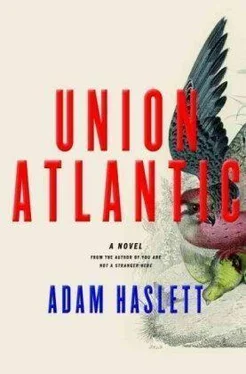A year ago his father had been flying high, pulling Nate out of school in the middle of the day to eat lunch at the Four Seasons or driving him in an old Rolls-Royce out to the tip of Cape Cod late on a weekday night to watch the reflection of the moon on the dark waters of the Atlantic. Knowing that his mother was sitting at home stricken with worry about where they might be made it hard for Nate to simply enjoy such moments, however much his father did. He had lost his last consulting job a year and a half earlier and Nate knew they were running out of money. The rush of ideas about the next business he planned to start came at Nate so hard the words took on physical force, like a wind blowing fine shards of glass. The descriptions of projects and investors, elaborated down to the last digit and address, were painful in their detail.
This relentless drive of his had lasted six months. Then, in the middle of June, his father had come home and gone to bed, where he had stayed for most of the summer, making only occasional forays into the garage or basement to escape the heat. He ate little and barely spoke, while Nate’s mother did her best to make it appear as if all were as usual.
Eventually, regaining energy, he’d begun to leave the house again, taking long walks on the trails over by the Audubon. He would depart before dawn and return around lunchtime. When he didn’t come back one afternoon, Nate’s mother called him at the supermarket where he worked after school and asked if he would go looking for him.
A quarter of a mile into the woods, Nate had come to the aqueduct that spanned the marsh, its concrete surface spotted with graffiti left by the kids who drank there on weekends. He and his father had crossed this bridge together countless times before, just meandering on a weekend afternoon, scouting out parts of the river they might row down if they had a boat. Until recently, Nate had thought nothing of their idyll of a companionship; it had simply always been there.
He crossed the bridge and continued along the path that followed the ridgeline into the forest. The Audubon preserve was a mile or so farther along, accessed from a road on the far side. Not many people walked up through this area so he wasn’t surprised not to meet anyone on the trail. But he only went so far. He didn’t walk all the way to the far end of the path that led down to the water’s edge; and he didn’t explore under the arches of the bridge on his way back or search up along the riverbank as he could have, as he might have. Rather, he stood at the aqueduct’s black, wrought-iron railing looking out over the turning leaves, wishing his father wouldn’t keep making his mother worry so.
The next morning, the police sergeant said only, “Up by the aqueduct,” when Nate’s mother asked where his father had hanged himself. The officer didn’t mention when his father had done it. And so Nate had no idea if he’d still been alive as he’d searched for him, too self-conscious to even call to him aloud.
About the months that had followed, Nate didn’t remember much. Luckily, his closest friends treated him with kid gloves for only a week or two before starting to give him the same shit they always did, returning his life to at least a semblance of what it had been.
He thought of them now, Emily and Jason and Hal, tempted once more to ditch this tutoring nonsense and call them to see if they’d started hanging out yet.
As he walked farther toward Winthrop Street, the houses grew sparser, this being the oldest, wealthiest part of town, made up mostly of estates.
Charlotte Graves, 34 Winthrop , along with a phone number. That’s all Ms. Cartwright had written on the note card. When he had called the woman to set up the appointment, she had been curt to the point of rudeness and offered no directions.
The mailbox bearing that number stood between two driveways, leaving it unclear which house it belonged to. The driveway to the left led down to a white-columned mansion stretched out along the river-bank, recent by the looks of it but built in a neoclassical style that invited you to forget the fact. Its thick cornices and stately windows and the perfect lawns that surrounded it were somehow resplendent even in the light of an overcast day. The other drive was a weedy track heading up to a barn and a shingled little box of a house, which looked as if it had been built centuries ago and not much cared for since.
A tutor of history, Nate thought. What were the odds?
He knew which his father would have picked. Which house he would have talked his way into, putting everyone at ease, charming them with his glittering words. For all Nate knew, his father already had. For all he knew, the mansion’s owners were among those in Finden whom his father had convinced to lend him boats or vintage cars, a habit he’d got into during that last spring of adventure.
Slowly, he headed down the hill to the mansion, where he climbed the steps to press the brass bell. The first ring produced no response. Glancing through a window, he didn’t see much of anything inside. He leaned over and, pressing his hand to the glass to block the reflection, saw that the entire front room was empty, not a stick of furniture in it. No rugs on the floor, nothing on the walls. On the other side of the door it was the same — a vast high-ceilinged room, a fireplace at one end, and nothing else but bare boards and plaster. One of the big new houses built on spec, he figured, waiting for an owner. He rang a second time, just in case.
Curious, he stepped along the front of the house and peered through another window into another bare room. The emptiness of the place intrigued him. All that finished space marked by nothing. Without content or association. A perfect blank.
But not quite, it seemed. Through the next window, he saw a flat-screen TV set up on a crate facing an old cloth couch. There were no chairs or tables here, no lights or fixtures, just the television and the couch and an empty beer bottle beside it. The real estate agent? he wondered; but then how could he or she show the place? It was an odd, slightly forlorn sight.
Giving up, he headed back across the circular drive, past a fountain with a cherub in the middle, and headed up the hillside to the neighboring house. This one looked as if it were sinking slowly into the earth. Hydrangeas had grown up to the lower panes of the downstairs windows and the peeling gutters overflowed with leaves. At one end, a drainpipe had broken off and leaned now against the side of the house. Up on the roof, the faded aluminum rods of an old television antenna had come loose from the chimney and tilted precariously toward the street.
There weren’t many places like this left in Finden. Ever since Nate had been a kid, they’d been building new houses everywhere they could, dividing up lots, turning fields and woods into new developments, the traffic worse every year.
He wondered if Ms. Cartwright had given him the wrong address, if perhaps this place was uninhabited. In fact, he hoped that it would be. But as soon as he tapped on the back door, he heard barking and the scuffle of paws on linoleum. From somewhere in the house a voice called out words he couldn’t discern. And then he heard footsteps approaching. A harsh whisper followed.
“Don’t be silly,” the voice said. “Since when does the devil knock?”
Then, more loudly, “Who is it?”
“It’s Nate Fuller. Are you Charlotte Graves?”
The door came open just a crack, and the snouts of two dogs pressed into the gap, followed a moment later by the deeply lined face of a gray-haired woman.
“Of course I am,” she said. “Who else would I be? Are you some sort of Mormon? They usually come in twos.”
“No,” he said, raising his voice to be heard over the barking. “I’m here for the tutoring. I called last week? We spoke on the phone?”
Читать дальше












